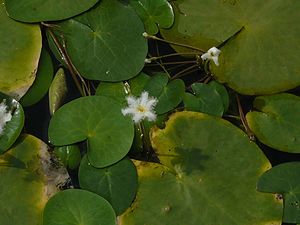Note: This is a project under development. The articles on this wiki are just being initiated and broadly incomplete. You can Help creating new pages.
Nymphoides indica - Kumudini
Kumudini is an evergreen perennial plant growing in mud and shallow water, Producing stems up to 1.5 metres long from a thick rhizome. The plant is sometimes harvested from the wild for local use as a food. It is often grown in ponds and boggy areas as an ornamental.
Contents
[hide]- 1 Uses
- 2 Parts Used
- 3 Chemical Composition
- 4 Common names
- 5 Properties
- 6 Habit
- 7 Identification
- 8 List of Ayurvedic medicine in which the herb is used
- 9 Where to get the saplings
- 10 Mode of Propagation
- 11 How to plant/cultivate
- 12 Commonly seen growing in areas
- 13 Photo Gallery
- 14 References
- 15 External Links
Uses
Bleeding disorders, Dysentery, Wound healing, Leucorrhoea, Menorrhagia.[1]
Parts Used
Chemical Composition
Common names
| Language | Common name |
|---|---|
| Kannada | Neeru thavare |
| Hindi | Kumudini, Bara chuli |
| Malayalam | Nedel-ambel, Chinnambal |
| Tamil | |
| Telugu | Anthara Thaamara |
| Marathi | NA |
| Gujarathi | NA |
| Punjabi | NA |
| Kashmiri | NA |
| Sanskrit | |
| English | Water snowflake |
Properties
Reference: Dravya - Substance, Rasa - Taste, Guna - Qualities, Veerya - Potency, Vipaka - Post-digesion effect, Karma - Pharmacological activity, Prabhava - Therepeutics.
Dravya
Rasa
Guna
Veerya
Vipaka
Karma
Pitta, Kapha
Prabhava
Habit
Identification
Leaf
| Kind | Shape | Feature |
|---|---|---|
| Simple | Rhizome 2-3 cm thick with prominent branch scars. Primary fertile branches many, petiole-like and uniphyllous, highly variable in length depending on the depth of water |
Flower
| Type | Size | Color and composition | Stamen | More information |
|---|---|---|---|---|
| Bisexial | Umbellate clusters at leaf bases | White | 5-8 | Flowers bisexual, distylous in umbellate clusters from the junction of the petiole and the branch; bract to 7 x 4 mm, ovate or oblong |
Fruit
| Type | Size | Mass | Appearance | Seeds | More information |
|---|---|---|---|---|---|
| Capsule | Capsules ellipsoid | Seeds c. 1.5 mm across, discoid, brownish, tubercled | {{{6}}} |
Other features
List of Ayurvedic medicine in which the herb is used
Where to get the saplings
Mode of Propagation
How to plant/cultivate
Succeeds in full sun and partial shade. Prefers a rich, sandy loam. Plants grow best when the roots are submerged in 30 - 60cm of water.[5]
Commonly seen growing in areas
Photo Gallery
References
External Links
- Ayurvedic Herbs known to be helpful to treat Bleeding disorders
- Ayurvedic Herbs known to be helpful to treat Dysentery
- Ayurvedic Herbs known to be helpful to treat Wound healing
- Ayurvedic Herbs known to be helpful to treat Leucorrhoea
- Ayurvedic Herbs known to be helpful to treat Menorrhagia
- Herbs with Tuber used in medicine
- Herbs with Flowers used in medicine
- Herbs with Stem used in medicine
- Herbs with Seeds used in medicine
- Herbs with common name in Kannada
- Herbs with common name in Hindi
- Herbs with common name in Malayalam
- Herbs with common name in Telugu
- Herbs with common name in English
- Habit - Aquatic herb
- Index of Plants which can be propagated by Seeds
- Index of Plants which can be propagated by Cuttings
- Herbs that are commonly seen in the region of Tropical area
- Herbs
- Menyanthaceae





